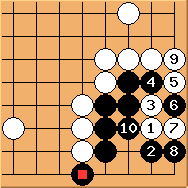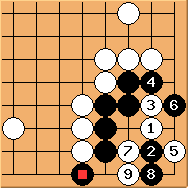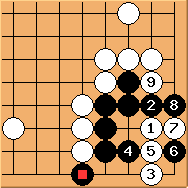All you need to know about Carpenter's Square - 20
Does  help in any way?
help in any way?
 is incorrect. Black is expecting this sequence similar to Diagram 19.2.
is incorrect. Black is expecting this sequence similar to Diagram 19.2.  would help in this case. However......
would help in this case. However......
 is the correct answer. Note that white can use this sequence in Shape 19 as well.
is the correct answer. Note that white can use this sequence in Shape 19 as well.
Black is one liberty too short and cannot play 'a'.
So black has to block at  . However,
. However,  is incorrect. This result is the same as Diagram 19.3 and black fails to make use of
is incorrect. This result is the same as Diagram 19.3 and black fails to make use of  .
.
Unlike Diagram 19.4,  tesuji now works. Thanks to
tesuji now works. Thanks to  black can throw in
black can throw in  to start a ko fight.
to start a ko fight.
 may atari from the other side, forming a different ko. But note that black takes the ko first so this result cannot be good for white.
may atari from the other side, forming a different ko. But note that black takes the ko first so this result cannot be good for white.
Since  in the previous diagram appears to be the key point,
in the previous diagram appears to be the key point,  wants to occupy that location first. To avoid the failure in Diagram 20.5,
wants to occupy that location first. To avoid the failure in Diagram 20.5,  is a must.
is a must.  is a nice idea. Black has to go back to
is a nice idea. Black has to go back to  to avoid the Bulky Five killing shape. So the result is a ko. If black wins the ko fight by connecting at
to avoid the Bulky Five killing shape. So the result is a ko. If black wins the ko fight by connecting at  , white can still play 'a' to form a seki, destroying 9 points of territory, although black also has a yose at 'b' that can get a few points back. Overall this solution seems to be slightly worse than Solution 1 for black.
, white can still play 'a' to form a seki, destroying 9 points of territory, although black also has a yose at 'b' that can get a few points back. Overall this solution seems to be slightly worse than Solution 1 for black.
 is a thoughtless move, hoping black to block at 'a' so that knowledge in Shape 7 can apply. But
is a thoughtless move, hoping black to block at 'a' so that knowledge in Shape 7 can apply. But  is good - please verify that black is unconditionally alive now.
is good - please verify that black is unconditionally alive now.
To summarise: black corner is quite resilient because of the hane move. Diagram 20.6 and Diagram 20.8 are the right solutions, resulting in ko.





 )
)



